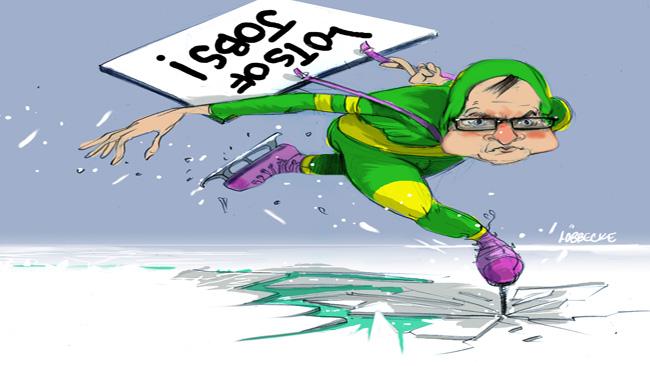
CAMPAIGNING is the enemy of governing. And while the prospect of being hanged concentrates the mind wonderfully, the moments before the high jump are rarely spent developing sound public policy. The Howard government's water initiative, launched in 2007 just after Labor's sharp rise in the polls, was public policy at its worst; the Gillard government's jobs plan provides it with a worthy competitor.
To call the jobs plan half-baked would do an injustice to frozen food. It is a kebab of recycled nostrums, failed ideas and reheated announcements, dipped in a protectionist sauce and greased with favours to union mates. But the plan's fundamental difficulty is that it cannot be taken seriously.
Even Greg Combet must have found it challenging to present the proposal to "embed" public servants in major resource projects without breaking into guffaws. No wonder he ignored the obvious questions: how could Canberra's "local content champions" know more about sourcing options than the supply specialists who run purchasing for those projects? Would the project managers have the right to sack these uninvited guests if they proved incompetent, a nuisance or worse? And would taxpayers be liable if bureaucrats' poorly considered advice led to accidents, delays and commercial losses?
On these, Combet had nothing to say. But that didn't lead him to temper his claims. The requirements imposed on major projects, he said, would shift "up to $6.4 billion of extra work per year to the Australian economy."
No evidence was released to support Combet's assertion. And that too is unsurprising. For it verges on the unbelievable.
The Bureau of Resource and Environmental Economics publishes estimates of the value of committed projects. Of those, most already have supply arrangements in place; but assume nonetheless that 50 per cent of the project pipeline's value remains contestable. According to the Reserve Bank, imports account for between 25 and 35 per cent of project outlays; given that starting base, increasing domestic sourcing by $6bn annually would require a more than 40 per cent reduction in the import content of spending on major resource projects by 2015/16 -- a degree of import substitution not even achieved by South African mining projects during sanctions.
Moreover, the pipeline is nearing its peak; it phases down rapidly as of next year. For the $6bn a year shift to be sustained out of a shrinking total, import substitution would need to rise steadily, approaching 100 per cent in six years' time.
To add impossibility to implausibility, Combet asserted import substitution on that scale could be secured at no cost. In reality, not only would project costs increase rapidly (further harming our resource industries), but wider damage would be imposed on the economy as a whole. For example, as imports targeted by the plan fell, the exchange rate would rise, increasing other imports; the effect would be to eliminate genuinely viable jobs in the areas not favoured by union bosses.
One might have expected those impacts to be discussed in the background paper prepared by Combet's department. But never in its 76 pages are any economy-wide detriments acknowledged. Instead, adopting the principle that "in skating across thin ice, our safety is our speed", the paper glosses over opportunity costs altogether, presenting the package as a free lunch.
But all that is beside the point; for Combet's rhetoric is hardly meant to be credible. Rather, like all announcement politics, it is mere vapourware, without substance or content: or to be precise, it is bullshit. As the philosopher Harry Frankfurt put it, bullshit's defining feature is that "the bullshitter does not reject the truth. He pays no attention to it at all." Its essence lies in a complete lack of concern for the facts; in St Augustine's eight forms of lying, it is the untruth whose intent is as the "indispensable means to some end that is distinct from the sheer creation of false beliefs."
That end is a moment's attention in the news cycle and the hope of a bounce in the polls. But this government's survival would take far more than a tune-up in public perception. Yet its ability to alter those perceptions is limited, as after five years of doing whatever gets it through the night, it now struggles even to fool any of the people any of the time.
But announcement politics is not just ineffective; it is counterproductive. Once the public has stopped listening, stunts merely confirm the sense of desperation at the top, debasing the currency for any real reforms the government might have in store. All initiatives become lead balloons, collapsing on those who launched them. Howard's water strategy provides an object lesson.
In November 2006, reversing an earlier fall in the Coalition's standing, Newspoll placed the contenders on exactly 50/50; but by January 2007, the Coalition's two-party-preferred vote had declined 5 percentage points. The water announcement was to be a circuit breaker; however, for all its publicity and squandered billions, it didn't dent the trend.
Yet those billions were not the strategy's only cost. By abandoning the economic high ground, it lowered the bar, allowing Labor and the Greens to make a poor policy even more distorting. And that has happened in this case too, as the government's protectionism has encouraged the Coalition to promote an anti-dumping policy no better than Labor's.
"Bullshit", Frankfurt concluded, "is a greater enemy of the truth than lies are", for it corrodes "the discipline required by dedication to the ideal of correctness": and that discipline removed, anything goes. This government's legacy will therefore not be merely Labor's self-destruction; it will be a political culture cheapened by disrespect for the facts, deprived of any anchors for assessing consequences and ever less capable of the clear thought needed to face our future.



